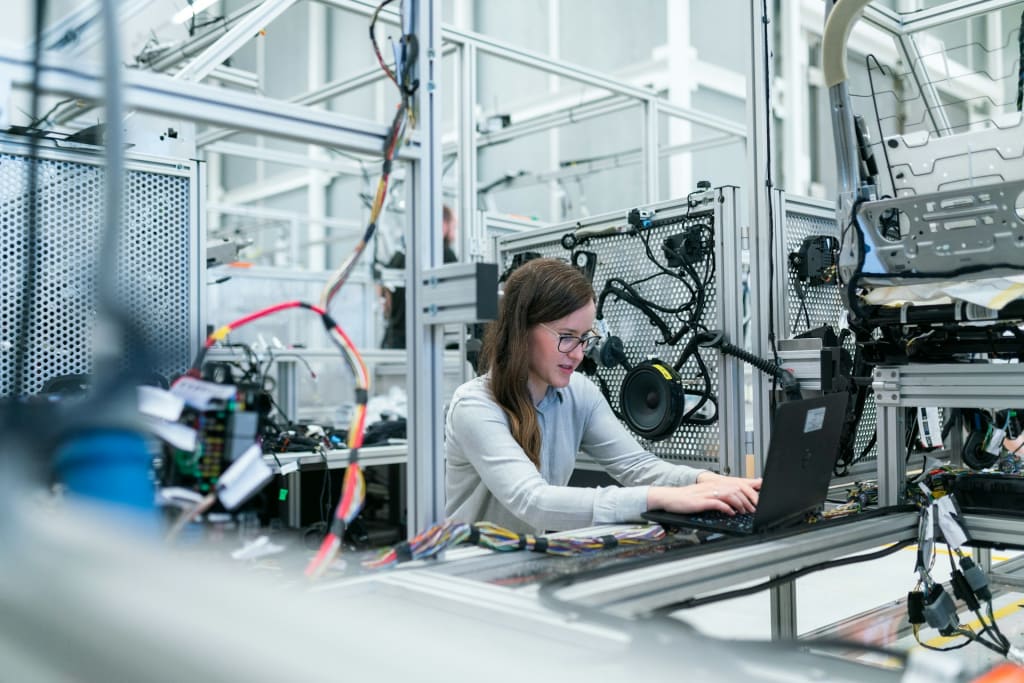Know the Python Benefits for Manufacturing Industry
Blog on benefits of Python in the manufacturing industry.

Python is not the first programming language that comes to mind when discussing automation in the manufacturing industry. Code written in Python runs slower than a compiled language, and it is not the best language for real-time control.
But there is a change, and Python, a high-level, interpreted language, is now finding an appeal in this sector. The current industrial scenario is changing how it looks at industrial automation and emphasizes smart machinery with better and improved self-sufficiency. It also looks at big data and complete integration with the next-generation technologies. This popular programming language offers many advantages for IIoT. Python is also well known for its ability to handle large data sets and high readability, which is essential when many engineers work on the same code. It is an open-source language with strong community support and is one of the many reasons for its application use.
This blog will discuss the various benefits of Python for the manufacturing industry.
Benefits of Python for the Manufacturing Industry
- Data analysis
Python possesses robust data analysis features which can significantly benefit the manufacturing industry. Python can handle large datasets, which helps gain insights from data. Its extensive libraries, like Pandas and NumPy, can help manufacturers process and analyze data to optimize their operations, predict maintenance, and generally improve product quality. Its Matplotlib and Seaborn libraries can be used to create graphical visualizations, enabling the stakeholders to make informed decisions. Python’s data analysis capability is helping the manufacturing industry to become more efficient and sustainable.
- Machine learning
The machine learning capacity of Python can be of significant importance for the manufacturing industry. Its Scikit-learn and TensorFlow libraries can be used for predictive analytics which can enable manufacturers to anticipate maintenance requirements and optimize operations. It can also be used to analyze patterns in production data which allows them to predict product quality, reduce wastage and improve efficiency. Python’s ML capability can also enhance automation with algorithm learning that can improve the process further.
- Process control
Python’s high readability and its extensive libraries makes it capable of process control in the manufacturing sector. The systems can monitor and adjust the manufacturing processes in real time, which helps ensure that the products are made as per specifications. It also enables customization in the manufacturing processes because of its open source nature, which allows it to meet any specific manufacturing requirement.
- Image processing
Manufacturers can use Python’s libraries like OpenCV and PIL to analyze images for quality control, enabling them to detect defects in real time. This helps develop high quality products and reduces waste. Its machine learning libraries can be used for training models that can help improve image analysis over time, which helps enhance accuracy. Python’s image processing also supports development of visual inspection systems, which aids in sorting and packaging tasks.
- Predictive maintenance
Python’s libraries like SciKit-learn and TensorFlow enable manufacturers to analyze historical data and use it to predict future maintenance requirements. This kind of timely intervention reduces downtime and increases the operational efficiency. At the same time Python’s machine learning capability can consistently improve predictions over time, which increases their accuracy. Predicting failures before they occur helps manufacturers save time, reduce costs and improve the overall productivity.
- Automation
Python’s high level syntax and libraries can help in simplifying development of automated systems, leading to reduction in time and effort required for manufacturing. Its compatibility with hardware and software also makes it ideal for controlling automated machinery. Additionally, Python’s data analysis and machine learning can enhance automation by enabling the systems to learn and improve over time. Python plays a crucial role for advancing automation in the manufacturing industry to increase innovation and productivity.
- Ease of use
Python has a clear and simple syntax and high readability which makes it easily accessible to even those who do have an extensive programming experience. This makes it possible to speed up development and deploy the solution that can range from data analysis to process control. Python’s extensive libraries can also simplify many complex tasks, thus reducing the need for customized coding. Python’s interactive nature also allows faster testing and debugging which speeds up the development cycle. Its ease of use can drive efficiency and innovation which makes it a preferred choice for the manufacturing industry.
- Extensibility and open source
Python offers many advantages to the manufacturing industry including extensibility and its open source nature. Python is freely available for use and modifications which in turn reduces software costs. Its extensibility lets manufacturers integrate Python with other existing systems and technologies which enhances their capabilities. Additionally, its large and active community is continuously engaged in developing and maintaining its wide range of libraries and tools, which provides ready solutions for various manufacturing challenges. Python’s open source nature and its extensibility helps foster innovation and allows manufacturers to customize solutions as per their specific needs.
Conclusion
Python offers many advantages that can help transform the manufacturing industry. Its ease of use, extensibility and open source nature increases its appeal and usability. A Python development company, with its expertise in Python and its extensive libraries can help manufacturers leverage the benefits to its full extent. A Python development company can offer customized solutions for unique manufacturing challenges and play a pivotal role in advancing the smart manufacturing process.
About the Creator
Ryan Williamson
A professional & security-oriented programmer having more than 6 years of experience in designing, implementing, testing & supporting mobile apps developed. Being techno geek, I love to read & share about the latest updates in technology.
Enjoyed the story? Support the Creator.
Subscribe for free to receive all their stories in your feed. You could also pledge your support or give them a one-off tip, letting them know you appreciate their work.






Comments
There are no comments for this story
Be the first to respond and start the conversation.